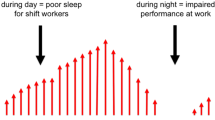Abstract
To examine the effect of shiftwork on lifestyle and mental health, a self-administered questionnaire survey was conducted among employees of a leading electrical appliances manufacturing company in Japan. The questionnaire included eight health practices recommended by Morimoto, the General Health Questionnaire-28 (GHQ-28) and demographic variables. Considering the effects of type of occupation, working hours and gender, analysis was focused on 295 male blue-collar mere employees working less than 8 hours per day and engaged in daytime work or two-shift work.
Scores for Health Practice Index (HPI) and physical exercise of shift workers were significantly lower than those of daytime workers for those from 30 to 45 years of age (p<0.05). However, in scores for HPI and each lifestyle factor, no significant difference was found among shift workers and daytime workers 29 or younger and 46 and older. In scores for the total GHQ-28 and its four subscales, no significant differences were found among shift workers and daytime workers 29 or younger, between 30 and 45, and 46 years of age and older. No significant effect of shiftwork was found on mental health status and lifestyle practices excluding physical exercise.
The findings suggested reduction of physiological and psychological stress due to shiftwork among employees of the major company. However, the effect of shiftwork on lifestyle practices and mental health status might be affected by various factors. Therefore an investigation of the work load in regard to shiftwork should be conducted precisely in the future.
Similar content being viewed by others
References
Gordon NP, Cleary PD, Parker CE, Czeisler CA. The prevalence and health impact of shiftwork. Am J Public Health 1986;76: 1225–8.
Kogi K. Shift work. In: Saito H, editor. Working Hours. Tokyo: Institute Science for Labor, 1981: 68–89. (in Japanese)
Seward JP. Occupational stress. In: LaDou J, editor. Occupational Medicine. California: Appleton and Lange, 1990: 471–3.
Frese M, Harwich C. Shiftwork and the length and quality of sleep. J Occup Med 1984;26: 561–6.
Tune GS. Sleep and wakefulness in a group of shift workers. Brit J Industr Med 1969; 26: 54–8.
Nakagawa K, Ishitake T, Iwamoto J, Suenaga T, Mori C, Matoba T, Takaki M, Hara H. Difference in perceived health between blue-and white-collar workers of a manufacturing factory by a self-administered questionnaire. Jap J Ind Health 1993;35: 188–97. (in Japanese)
Yamaguchi K, Fujiki Y. Life and fatigue of the shiftworkers with two days off in the weekend. Jap J Ind Health 1992;34: 652–5. (in Japanese)
Koller M. Health risks related to shift work. Int Arch Occup Environ Health 1983;53: 59–75.
Alfredsson L, Karasek R, Theorell T. Myocardial infarction risk and psychosocial work environment: An analysis of the male Swedish working force. Soc Sci Med 1982;16: 463–7.
Kawakami N, Haratani T, Kaneko T, Koizumi A. Relationship between health practices and depressive mood among industrial workers. Jap J Ind Health 1987;29: 55–63. (in Japanese)
Rutenfranz J, Colquhoun WP, Knauth P, Gahta JN. Biomedical and psychosocial aspects of shift work. Scand J Work Environ Health 1977;3: 165–82.
Rutenfranz J, Knauth P, Colquhoun WP. Hours of work and shift work. Engonomics 1976;19: 331–40.
Committee for Shift Work of Japanese Association of Industrial Health. Guideline for night work and shift work. Jap J Ind Health 1978;20: 308–44.
Fujimoto T. Issues Concerning the Working Hours Today. Tokyo: Institute Science for Labor, 1987: 195–234. (in Japanese)
Morimoto K, editor. Lifestyle and Health-Health Theory and Demonstrable Research. Tokyo: Igakushoin, 1991: 66–138. (in Japanese)
Belloc NB, Breslow L. Relationship of physical health status and health practices. Prev Med 1972;1: 409–21.
Breslow L, Enstrom JE. Persistence of health habits and their relationship to mortality. Prev Med 1980;9: 469–83.
Morimoto K. Life-style and genetic factors that determine the susceptibility to the production of chromosome damage. In: Obe G, Natarajan AT, editors. Chromosomal aberrations: Basic and applied aspects. Berlin: Springer-Verlag, 1990: 287–301.
Morimoto K, Takeshita T, Takeuchi T, Maruyama S, Ezoe S, Mure K, Inoue C. Chromosome alterations in peripheral lymphocytes as indices of lifestyle and genotoxicity. Int Arch Occup Environ Health 1993;65: S37-S41.
Kusaka Y, Kondou H, Morimoto K. Healthy lifestyles are associated with higher natural killer cell activity. Prev Med 1992;21: 602–15.
Shirakawa T, Morimoto K. Lifestyle effect on total IgE. Allergy 1991;46: 561–9.
Ezoe S, Morimoto K. Behavioral lifestyle and mental health status of Japanese factory workers. Prev Med 1994;23: 98–105.
Maruyama S, Kohno K, Morimoto K. A study of preventive medicine in relation to mental health among middle-management employees (part 1). Jap J Hyg 1994;49: 887–901. (in Japanese)
Nakayama K, Yamaguchi K, Maruyama S, Morimoto K. Relationship between lifestyle and the scores of the GHO-28, working-life satisfaction in workers. J Occup Health 1995;37: S 409. (in Japanese)
Maruyama S, Sato H, Morimoto K. Relationship between working-life satisfaction, health practices and primary symptoms/problems. Jpn J Hyg 1991;45: 1082–94. (in Japanese)
Takeda F, Kawata C, Sonoda K, Kato T, Uchiyama K. A study of the relationship between job type and/or position to life style and health of male white-collar workers. Jap J Pub Health 1992;39: 326–40. (in Japanese)
Endo Y. Problems of working hours and daily life conditions of present-day workers in Japan. J Sci Labor 1986;62: 277–90. (in Japanese)
Tarumi K, Hagihara A, Morimoto K. An inquiry into the effects of working time and commuting time on lifestyle in white-collar workers. Jap J Pub Health 1992;39: 163–71. (in Japanese)
Goldberg DP, Hillier VF. A scaled version of the General Health Questionnaire. Psychol Med 1979;9: 139–45.
Kawada T, Suzuki S. Factor structure of self-rating depression scale by Zung and prevalence of depressive state of night shift workers. Jap J Ind Health 1992;34: 131–6.
Author information
Authors and Affiliations
Rights and permissions
About this article
Cite this article
Nakayama, K., Yamaguch, K., Maruyama, S. et al. Effects of shiftwork on lifestyle and mental health status of employees of a major Japanese electrical manufacturer. Environ Health Prev Med 2, 16–20 (1997). https://doi.org/10.1007/BF02931224
Received:
Accepted:
Issue Date:
DOI: https://doi.org/10.1007/BF02931224




